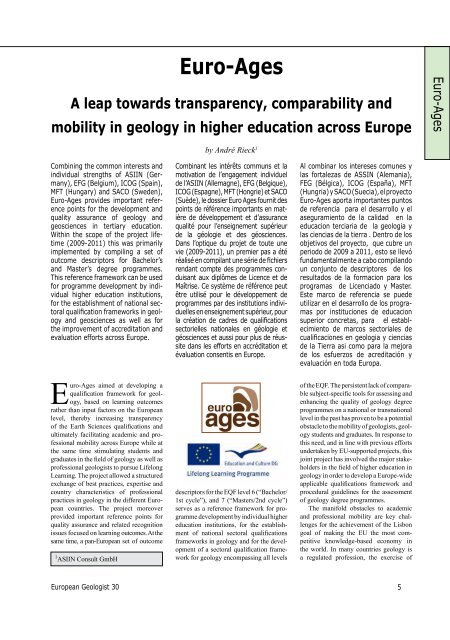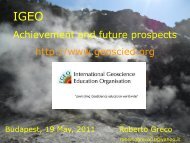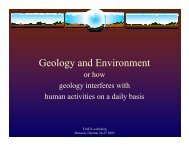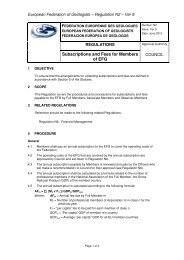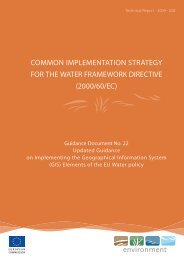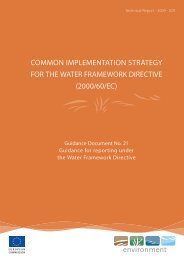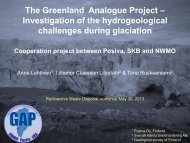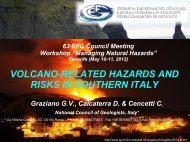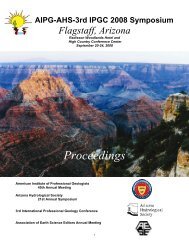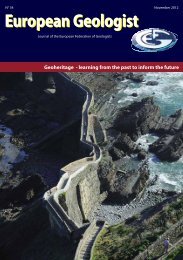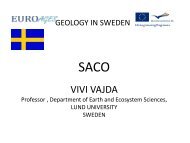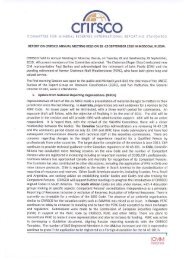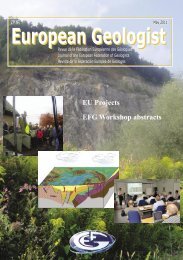EGM 30 download.pdf - European Federation of Geologists
EGM 30 download.pdf - European Federation of Geologists
EGM 30 download.pdf - European Federation of Geologists
You also want an ePaper? Increase the reach of your titles
YUMPU automatically turns print PDFs into web optimized ePapers that Google loves.
Euro-AgesA leap towards transparency, comparability andmobility in geology in higher education across EuropeEuro-AgesCombining the common interests andindividual strengths <strong>of</strong> ASIIN (Germany),EFG (Belgium), ICOG (Spain),MFT (Hungary) and SACO (Sweden),Euro-Ages provides important referencepoints for the development andquality assurance <strong>of</strong> geology andgeosciences in tertiary education.Within the scope <strong>of</strong> the project lifetime(2009-2011) this was primarilyimplemented by compiling a set <strong>of</strong>outcome descriptors for Bachelor’sand Master’s degree programmes.This reference framework can be usedfor programme development by individualhigher education institutions,for the establishment <strong>of</strong> national sectoralqualification frameworks in geologyand geosciences as well as forthe improvement <strong>of</strong> accreditation andevaluation efforts across Europe.by André Rieck 1Combinant les intérêts communs et lamotivation de l’engagement individuelde l’ASIIN (Allemagne), EFG (Belgique),ICOG (Espagne), MFT (Hongrie) et SACO(Suède), le dossier Euro Ages fournit despoints de référence importants en matièrede développement et d’assurancequalité pour l’enseignement supérieurde la géologie et des géosciences.Dans l’optique du projet de toute unevie (2009-2011), un premier pas a étéréalisé en compilant une série de fichiersrendant compte des programmes conduisantaux diplômes de Licence et deMaîtrise. Ce système de référence peutêtre utilisé pour le développement deprogrammes par des institutions individuellesen enseignement supérieur, pourla création de cadres de qualificationssectorielles nationales en géologie etgéosciences et aussi pour plus de réussitedans les efforts en accréditation etévaluation consentis en Europe.Al combinar los intereses comunes ylas fortalezas de ASSIN (Alemania),FEG (Bélgica), ICOG (España), MFT(Hungria) y SACO (Suecia), el proyectoEuro-Ages aporta importantes puntosde referencia para el desarrollo y elaseguramiento de la calidad en laeducacion terciaria de la geologia ylas ciencias de la tierra . Dentro de losobjetivos del proyecto, que cubre unperiodo de 2009 a 2011, esto se llevófundamentalmente a cabo compilandoun conjunto de descriptores de losresultados de la formacion para losprogramas de Licenciado y Master.Este marco de referencia se puedeutilizar en el desarrollo de los programaspor instituciones de educacionsuperior concretas, para el establecimientode marcos sectoriales decualificaciones en geologia y cienciasde la Tierra asi como para la mejorade los esfuerzos de acreditación yevaluación en toda Europa.Euro-Ages aimed at developing aqualification framework for geology,based on learning outcomesrather than input factors on the <strong>European</strong>level, thereby increasing transparency<strong>of</strong> the Earth Sciences qualifications andultimately facilitating academic and pr<strong>of</strong>essionalmobility across Europe while atthe same time stimulating students andgraduates in the field <strong>of</strong> geology as well aspr<strong>of</strong>essional geologists to pursue LifelongLearning. The project allowed a structuredexchange <strong>of</strong> best practices, expertise andcountry characteristics <strong>of</strong> pr<strong>of</strong>essionalpractices in geology in the different <strong>European</strong>countries. The project moreoverprovided important reference points forquality assurance and related recognitionissues focused on learning outcomes. At thesame time, a pan-<strong>European</strong> set <strong>of</strong> outcome1 ASIIN Consult GmbHdescriptors for the EQF level 6 (“Bachelor/1st cycle”), and 7 (“Masters/2nd cycle”)serves as a reference framework for programmedevelopment by individual highereducation institutions, for the establishment<strong>of</strong> national sectoral qualificationsframeworks in geology and for the development<strong>of</strong> a sectoral qualification frameworkfor geology encompassing all levels<strong>of</strong> the EQF. The persistent lack <strong>of</strong> comparablesubject-specific tools for assessing andenhancing the quality <strong>of</strong> geology degreeprogrammes on a national or transnationallevel in the past has proven to be a potentialobstacle to the mobility <strong>of</strong> geologists, geologystudents and graduates. In response tothis need, and in line with previous effortsundertaken by EU-supported projects, thisjoint project has involved the major stakeholdersin the field <strong>of</strong> higher education ingeology in order to develop a Europe-wideapplicable qualifications framework andprocedural guidelines for the assessment<strong>of</strong> geology degree programmes.The manifold obstacles to academicand pr<strong>of</strong>essional mobility are key challengesfor the achievement <strong>of</strong> the Lisbongoal <strong>of</strong> making the EU the most competitiveknowledge-based economy inthe world. In many countries geology isa regulated pr<strong>of</strong>ession, the exercise <strong>of</strong><strong>European</strong> Geologist <strong>30</strong>5


